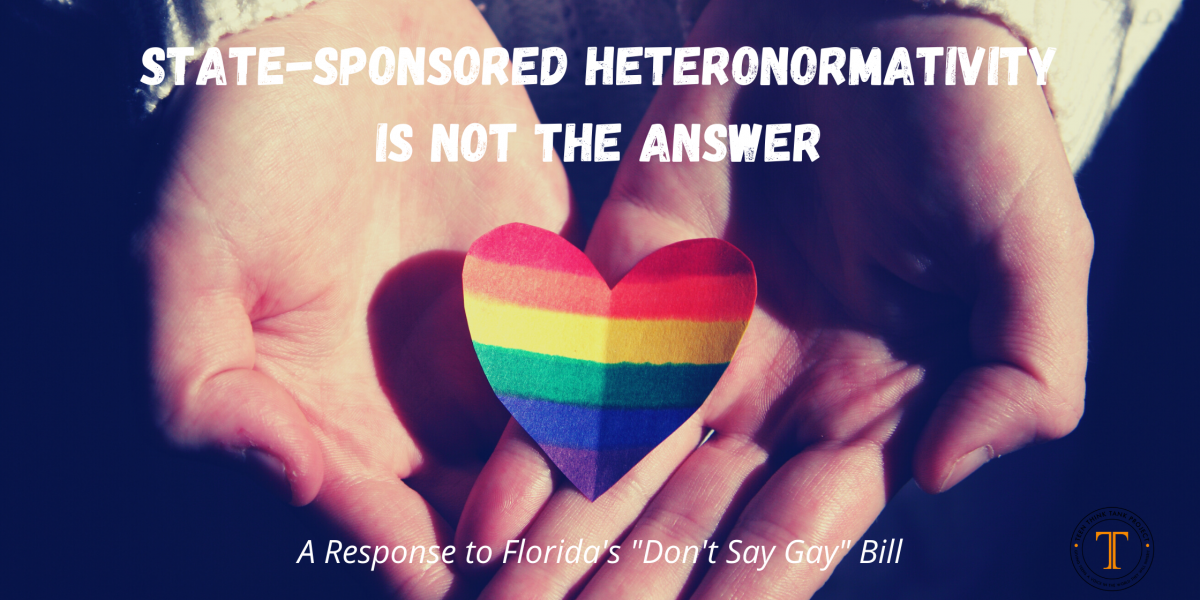March 31, 2022
by Kelly Nagle and Matthew Tirrell
March 28, 2022 was a sad day for equity and social justice in this country. It demonstrated that a deliberate violation of human rights could be enshrined into law. It modeled for other states and democratic nations that local governments are willing to suppress its citizens’ voices. On March 28th, Florida’s Governor, Ron DeSantis, signed into law the Parental Rights Education bill, dubbed by opponents as the “Don’t Say Gay” bill, which was previously passed in both the House and the Senate.
The “Don’t Say Gay” bill restricts the teaching of sexual orientation and gender identity in grades K-3 and prohibits the teaching or discussion of sexual orientation and gender identity in other grades that is not “age or developmentally appropriate”. Furthermore, parents will have the ability to sue educators and school districts if they feel that teachings or discussions are not appropriate, which could deter teachers from supporting vulnerable youth or addressing the subject entirely.
The bill is a gross violation of LGBTQI+ human rights and further imperils an already vulnerable community. When Governor DeSantis signed the bill, his stroke of the pen set the stage for endangering thousands of young people in the LGBTQI+ community and creating government-approved, systematic discrimination and censorship.
The LGBTQ+ community already faces high levels of homelessness, self-harm, suicide and substance abuse. The American Addictions Centers notes that “LGBTQ adults are more than twice as likely as their heterosexual counterparts to use illicit drugs and almost twice as likely to suffer from a substance abuse disorder” (1). LGBTQI+ youth are twice as likely to be homeless compared to their non-LGBTQI+ peers. The number is even higher for Black and multiracial LGBTQI+ youth (2). The bill is likely to exacerbate the long-term consequences that LGBTQI+ youth already face as a marginalized and minoritized population.
Schools hold a special place in the fabric of our society as environments that are critical to the healthy development of the next generation. To support our national stability, schools need to be a place of tolerance, inclusion, and safety. Instead, the bill is poised to create conditions for a divisive and discriminatory learning environment. It is likely to perpetuate the cycle of intolerance against the LGBTQI+ community and promote heteronormative supremacy that stigmatizes and marginalizes LGBTQI+ students. Such exclusion is likely to breed an incognizant sense of dominance and a blindness to privilege for heterosexual youth – to the detriment of their sexual minority peers. Children’s questions and pedagogically sound edification of LGBTQI+ topics are not the problem. Rather, exposure to indoctrinated enmity and institutional oppression is harmful to all school children and our communities.
By eliminating lessons or curriculums that include LGBTQI+ education, we are teaching young children who may already be grappling with their sexual orientation and gender identity that something is wrong with them and they are unwanted. Such ostracization is likely to keep LGBTQI+ youth “in the closet” and vulnerable to the harms of social isolation. The spirit of this bill reinforces a culture of superiority for cisgender and heterosexual children, and it teaches them that devaluing their peers is acceptable and even authorized. Without intercession, these same students are likely to grow into intolerant adults with the power and inclination to further devise oppressive systems through anti-LGBTQI+ laws, policies, and rhetoric.
Validation and affirmation are critical to the psychological health of all human beings. Instead of banning or minimizing discourse on gender and affectional orientation, we would do well to encourage students to embrace their (and each other’s) unique qualities. The world beyond the classroom is not solely cisgender and heterosexual. It is diverse, and in many communities and corporations, diversity, equity, and inclusion are celebrated and aspirational. Society would benefit from children having a safe environment in which to explore issues that will prepare them for adulthood. Instead, this bill would teach children how to become intolerant, divisive, and exclusionary from an early age.
Threatening empathetic educators who want to support LGBTQI+ students also cuts off important resources that are vital to a student’s emotional and mental well-being. For some students, educators are their sole resource for understanding and contextualizing their sexual orientation and gender identity. Unfortunately, many LGBTQI+ students do not achieve developmentally appropriate identity formation when they are rejected at home and in their communities…..and now in their schools.
In addition to potentiating harmful effects on students, the construction of the bill begs the question of parity. Do the legislators and governor acknowledge that unlawful discussion of sexual orientation must apply to all orientations, including heterosexuality? Would this not inherently preclude education on reproduction, since it is a primarily heterosexual act? Is the state prepared to discipline school districts that include sex education (e.g. lessons on reproduction) in their curriculum? Will the state honor the rights of gay parents to sue school districts that allow the teaching of heterosexual themes that are not “developmentally appropriate” for their children, or will that right only be reserved for straight parents? Is the state prepared to ban classic literature, such as Romeo and Juliet, that is laden with heterosexual language and passions? Or will use and interpretation of the bill merely serve to sanction a double standard in favor of the sexual majority? If proponents of the bill laud its basic tenets and deny that it endorses discrimination against people who are nonheterosexual, then they must be willing to apply the bill’s restrictions and provisions equitably to all people.
The short-sightedness of this legislation is a disservice to all youth, not just LGBTQI+ school children, because ultimately, all of society suffers from the discrimination of any one sector. Straight, cisgender youth who do not learn how to engage equitably with peers who differ from themselves will be set up for social atrophy as they grow into adulthood. Prohibiting the representation of an entire segment of our society from curriculums is not the answer. Rather, incorporating diversity and inclusion programs into curriculums provides a more effective way to support students who are impacted by social justice issues and provide all students with foundational skills to live and work in diverse communities. Teaching students mutual respect and fostering connection amid differences creates a far healthier society for everyone.
If you would like to learn more about how to be an ally to the LGBTQI+ community, please:
- Understand the threats LGBTQI+ individuals face.
- Follow and promote organizations that support and defend the LGBTQI+ community, like the ACLU, Human Rights Campaign, It Gets Better, Lambda Legal, PFLAG, and The Trevor Project.
- Be supportive of people who disclose their status as a sexual or gender minority.
- Don’t make assumptions about a person’s gender identity or sexual orientation. Proactively identify your preferred pronouns.
- Stand up to homophobic and transphobic comments.
- Challenge the status quo of heteronormative systems and policies (e.g., blood donation)
- Support inclusive policies in your school or workplace.
- Be open to learning from others.
Sources
- Kaliszewski, Michael. “Why Substance Abuse is Higher within the LGBTQ Community.” American Addiction Centers. October 26, 20221. https://americanaddictioncenters.org/lgbtqiapk-addiction/why-substance-abuse-is-higher-within-the-lgbtq-community
- “Homelessness and Housing.” Youth.gov. Accessed March 13, 2022. https://youth.gov/youth-topics/lgbtq-youth/homelessness
About the Authors
Kelly Nagle is the co-founder of the Teen Think Tank Project and host of Here’s the Problem podcast. She is also a two-time international best-selling author, consultant, entrepreneur, and political scientist. Kelly received her M.A. in Political Science – United Nations and Global Policy from Rutgers University where her research focused on human rights, gender equity, and terrorism, primarily in Africa and the Middle East. She received her B.A. in History from Loyola College in Maryland. Her passion is to create a better world by empowering others to learn the skills that will make them better leaders and global citizens.
Matthew Tirrell is a Licensed Professional Counselor, National Certified Counselor, and Approved Clinical Supervisor in the state of New Jersey. He is the Director of Field Placement and Adjunct Professor in the Department of Professional Counseling at Monmouth University, and he is a doctoral candidate in the Counseling program at Montclair State University. Matthew is a member of the Society for Sexual, Affectional, Intersex, and Gender Expansive Identities, a division of the American Counseling Association. The Association for Counselor Education and Supervision named Matthew an Emerging Leader in counselor education. He has published and presented nationally on a variety of counseling related topics. His current research focus is on ethical disparities in the treatment of affectional and gender minorities.




